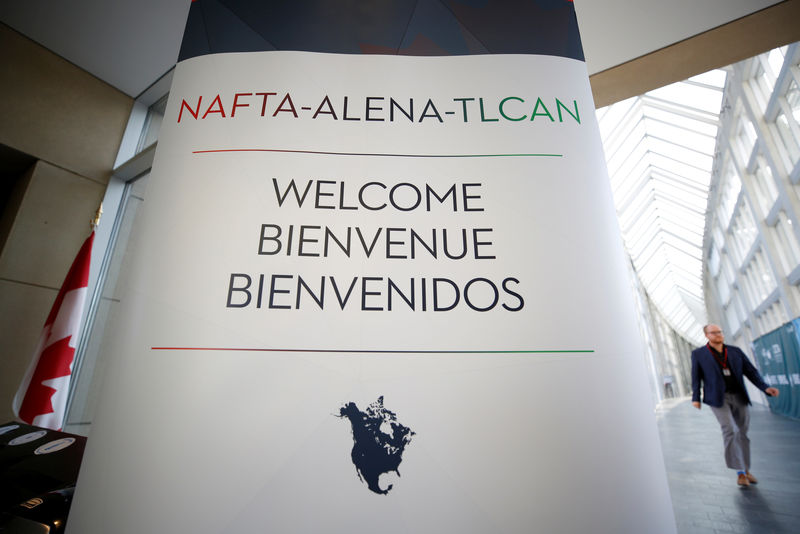(Corrects Carlos Pascual's employer to IHS Markit, from IHS Global Energy)
By David Alire Garcia
MEXICO CITY, Nov 2 (Reuters) - Uncertainty about the fate of the North American Free Trade Agreement (NAFTA) and investor protections it guarantees could crimp future investment in Mexico's oil industry, including a high-stakes January deepwater auction.
Ahead of a fifth round of NAFTA talks in Mexico City in mid-November, Washington's tough demands that partners Canada and Mexico resist has clouded the future of the 23-year-old pact President Donald Trump has threatened to quit if he cannot get a better deal. January deepwater tender of 29 blocks holding some 4.2 billion barrels of prospective reserves, could suffer if concerns about NAFTA's future persuaded oil majors such as Chevron (NYSE:CVX) CVX.N and Exxon Mobil Corp (NYSE:XOM) XOM.N to sit out the auction, oil executives and former government officials say.
So far, 17 companies have begun the process of pre-qualifying for the auction.
"Future investment without those investment protections of NAFTA will take into account the higher level of risk of any dispute not being settled in a more fair manner," Tim Callahan, Mexico country manager for Australia's BHP Billiton (LON:BLT) BHP.AX , told Reuters.
Energy firms worry the end of NAFTA could eliminate the so-called Investor State Dispute Settlement, which allows such conflicts to be settled via international arbitrators, overriding contractual clauses that only reference local courts.
Last December, BHP Billiton won a 60 percent stake in the $11 billion Trion field in the Gulf of Mexico, the flagship deepwater project of state-owned oil company Pemex.
That same day, eight of 10 blocks were awarded in the deepwater auction, yielding investment commitments worth hundreds of millions of dollars in the first few years of the contracts alone by firms like U.S.-based Chevron and Murphy Oil (NYSE:MUR).
The auctions are part of a 2013 energy reform that ended Pemex's monopoly on oil and gas production. So far, the reform has secured investment pledges that will eventually be worth about $80 billion, the government says.
Callahan, who heads the Mexican oil producer association's NAFTA committee, pointed to longstanding nationalist sentiment toward oil and a lack of legal precedents during the 75-year Pemex monopoly.
"I don't think any of us want to be the first to test in the Mexican courts how they're going to rule on any disputes when it comes to oil," he said.
Threats to NAFTA may force some U.S. oil firms to opt out of January's tenders, said former deputy energy minister Lourdes Melgar, an architect of the auctions. Some deem the investor dispute mechanism "essential" to protect investments, she added.
Some of the biggest investments to date were made only after the government assured firms behind closed doors that any expropriation or administrative withdrawal of contracts could be appealed using the NAFTA resolution mechanism, said Carlos Pascual, a former U.S. ambassador to Mexico now at IHS Markit.
The assurances were made before Trump's surprise election win and company concerns over investor protections lasted "up until the last minute" before bids were submitted, Pascual said.
Without NAFTA, investment disputes could fall to Mexican courts, which unsettles some firms concerned that local judges are often susceptible to bribes or intimidation, oil company executives and former officials say.
"It's a fight for the oil and gas dollar now, and if the companies aren't treated fairly, then there's lots of other places to go," said Craig Steinke, head of Canada-based Renaissance Oil Corp ROE.V , a company that has won five onshore contracts in Mexico.
Energy Minister Pedro Joaquin Coldwell told Reuters that even without NAFTA protections, respect for due process was embedded in Mexico's legal system. He added that Mexico has more than a dozen other bilateral investment treaties with similar protections as NAFTA, a point that several oil executives who have spoken to Reuters in private also make.
"I don't think the industry should be worried," Coldwell said.
However, leftist presidential hopeful Andres Manuel Lopez Obrador, who has led early polls for next July's election, has a different message.
Lopez Obrador promises to review signed oil contracts and his top energy advisor Rocio Nahle said foreign companies should not bank on bypassing local courts.
"They need to be careful ... and respect Mexico's laws because this is Mexican territory," Nahle, who also leads Lopez Obrador's party in the lower house of Congress, told Reuters.
